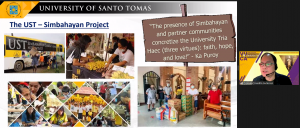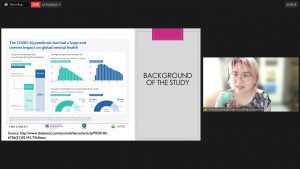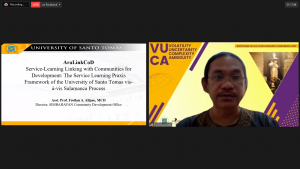The UST Simbahayan Community Development Office (SIMBAHAYAN), in partnership with the Research Center for Social Sciences and Education (RCSSED) and in collaboration with the Dominican Family for Justice, Peace, and Care for Creation-Philippines (DFJPCC-Phils.) held a virtual research conference on March 4, 2022.



This year’s theme for the Bartolome De Las Casas Research Conference was “Community Engagement and Service-Learning in a V.U.C.A. World: Thriving, Sustaining, and Empowering Towards Compassionate Education.”
The morning plenary session commenced with the presentation of SIMBAHAYAN Director Asst. Prof. Froilan A. Alipao, MCD, with his paper titled, “AraLinkCoD (Service-Learning Linking with Communities for Development): The Service-Learning Praxis Framework of the University of Santo Tomas vis-à-vis Salamanca Process.”
He concluded that the Salamanca process is a vital resource to strengthen, develop, and sustain the Service-Learning praxis framework of the University of Santo Tomas as a Dominican educational institution amid dynamic and complex realities. The components of this framework encompass and suggest the contextualization of the mission on justice and peace, integration of Catholic Social Teaching, defense of human rights, promotion and living of Laudato Si’ and Fratelli Tutti, collaboration within the mission, and improvement of structures of communication, strengthening of Dominican presence and solidarity within, and taking prophetic stands against sinful structures of power that oppress people and violate the whole of creation.
It was then followed by the insights shared by the Executive Assistant of the Office of Vice-Rector for Religious Affairs, Mr. Leo-Martin Angelo R. Ocampo.
Subsequently, three parallel sessions focused on Research and Service-Learning, and Service-Learning Amidst the Pandemic. The presenters of Parallel Session 1 were Mr. Adrian Romero with his paper, “Social Solidarity sa Panahon ng Social Distancing: Kwento ng Birtwal na Service-Learning ng UST NSTP CWTS/LTS”; Ms. Micah S. Estrologo with her thesis, “A Phenomenological Study of Service-Learning Experiences in National Service Training Program of University of Santo Tomas (UST) Selected College Students in the Time COVID-19 Pandemic”; Mr. Christian Erold Enriquez with his study, “Combo-Home Building System: A Grassroots Approach for Community-Based Incremental Residential Development in Compostela Valley, Mindanao”; and Sr. Jenny P. Fajardo, O.P., with her group research titled, “A Report on the Black Sand Mining in San Narciso and Botolan, Zambales, Philippines.”
Parallel Session 2 delved into Research and Service-Learning with the presentations of Dr. Jayson A. Punzal on his paper, “The Effectiveness of Community-Based Nutritional Health Program in Improving Biophysiologic Measures among Elderly”; Mr. Ravinanjo Argayoso with his thesis, “The Effectiveness of Simbahayan Community Development Projects at Barangay Sibulan, Nagcarlan, Laguna”; and the group of Mr. Lorenzo Jael S. Mallari, Mr. Dave Joss T. Quigao, and Ms. Athena Kryshna AD. Salgado, in their study, “Assessing Telerehabilitation Readiness among Older Adults with Hypertension in Communities in Rizal and Laguna: A Cross-Sectional Analytic Study.”
Parallel Session 3 shed light on the topic of Service-Learning amidst the pandemic. Ms. Beatriz Bravo Sacdalan and Mr. Gavin Joseph L. Cruz discussed their paper “Are We on The Right Track? The Lived Experience of The Junior High School Students of Barangay 472 & 473 Sampaloc, Manila”; Asst. Prof. Ginavee F. Dapula, Ph.D., with her research titled, “The Perceived Challenges Faced by Selected Microenterprises amidst COVID-19 Pandemic”; and Ms. Line Nalangan presented a group study titled “Tanimang Bayan (Community Food Garden) in Sitio San Roque Urban Poor Community: Securing Food and Asserting Land Rights in COVID-19 Times.”
UST SIMBAHAYAN Assistant Director Asst. Prof. Evalyn Abiog, Ph.D., began the afternoon session with her synthesis of the morning plenary and parallel sessions. She expressed her gratitude, impressions, and salutations towards the presenters of the morning plenary for sharing their nuggets of wisdom as they presented their research studies.
Asst. Prof. Maria Carinnes P. Alejandria, Ph.D. was given the online spotlight to shed light on her study titled, “Mapping of the Socio-Cultural Factors and Determinants Associated with Depression, Anxiety, Self-Harm, And Suicidal Behavior Among University Students.”
Alejandria presented the findings in multiple themes, some of which revolved around the students’ daily concerns and the role of the faculty. She mentioned that faculty members could promote mental health well-being among students by being keen on looking into some symptoms that students are experiencing and referring them to mental health professionals.
The theme of students’ involvement in school organizations as well as community volunteering activities was also brought up, providing even more depth to the discussion. As the study suggests, involvement in community work and service increases the students’ well-being, which gives the students some form of support.
Following that train of thought, the next theme is all about the activities with peers suggesting that those activities provide the students with ease and comfort in their time of need. At the end of her presentation, she mentioned that the ultimate goal of the study is to promote a more holistic approach to mental health. Since our Filipino youth are experiencing a mental health crisis, a fully western approach will not be the most efficient, as mentioned by Dr. Alejandria.
Subsequently, Ms. Ma. Regina Atinaja, a Guidance Counselor at the UST Counseling and Career Center, provided her reactions and insights on the presentation. Atinaja began by talking about the time when she came across a news release by the World Health Organization. It was a news article relating to the COVID-19 pandemic that triggers a 25% increase in prevalence of anxiety and depression worldwide. She shared that it was a wake-up call to all countries to step-up their mental health services and support. Atinaja also urged national leaders to continue their efforts in making mental health services and support accessible to all, especially the less privileged.
The presenters of Parallel Session 4 were the College of Tourism and Hospitality Management (CTHM) Dean Assoc. Prof. Gezzez Giezi G. Granado, DCL, Assistant Dean Assoc. Prof. Evangeline E, Timbang, Ph.D., Asst. Prof. Maria Conception A. Ang, and Ms. Fhamela F. Sarmiento, with their paper titled, “Sustainable Community–Based Tourism Potential and Development of Barangay San Manuel, Echague, Isabela in the New/Next Normal.” They discussed how the pandemic challenged the tourism industry in Isabela. Highlighting the community-based approach to improving the tourism sector, village people can build new opportunities for themselves and for their communities.
Following the presentation, Mr. Avi Ben P. Andalecio, discussed his study entitled, “Pagbalangkas: Issues and Opportunities on Natural Heritage Branding and Sustainability- The Case of UNESCO World Heritage Nomination for Samar Island Natural Park (SINP) Philippines.” The presentation highlighted the need to preserve and protect the country’s natural heritage through sustainable ecotourism development. The presentation is a testament to the role of environmental conservation in the country.
In light of the issues in sustainable tourism and national heritage, another presentation spoke on the role of heritage in the youth’s future. Mr. Jame Monren T. Mercado shared “Pamana sa Mata ng mga…Bata? (Heritage in the Eyes of the…Child?) A Phenomenological Study on The Experiences of Student Tour Guides on Heritage Sustainability-The Case of San Nicolas, Ilocos Norte, Philippines.” He described how natural heritage is a historical treasure in the eyes of youth that must be preserved and protected.
Mr. Karl-Richard S. Dela Torre presented “Agkuyog: Community Participation in Tourism Development for the New Normal, the Case of Candon City, Ilocos Sur Philippines.” He emphasized the importance of community engagement in promoting tourism.
Ms. Cassandra Barbara M. Aurelio, Ms. Maria Nakanomyo, and Ms. Renselle Joy DL. Palomo also shared their study, “Candon City Ecotourism Park Sustainable Tourism and Strategic Development Plan 2021-2025.” They gave a report on how tourism improved in Candon City through sustainability measures.
The same theme of community engagement in the tourism sector was highlighted by Mr. Rafael Anton Manuel M. Dionisio, Mr. Mark Ryan J. Isidro, Ms. Ana Therese Jin-ju A. Lee, Ms. Katrina Luz P. Martinez, Ms. Ginelle Aira T. Rose, Mr. Raphael Frederick M. Tamayo, Ms. Justin Miccaela T. Tampolino, and Ms. Audrey Veronica Wednesday T. Valentin in their study titled, “Myth and Reality of Community-based Tourism in Romblon, Philippines: A Structural Equation Model.” The last presenters for this session were Mr. Arnulfo Ricardo A. Butiong and Ms. Kathrine Camille A. Nagal, with their study, “Recovery in the MICE Industry: The Case of Davao City.”
For the sixth Parallel Session, the first presenters—Ms. Naomi Joyce S. Sibal, and Ms. Krizia Mile Joy B. Yu discussed, “An Evaluation Study on the Mathematics Proficiency Program of Grade 10 Aeta Learners.” The study provided insights about the academic improvement of indigenous children. Asst. Prof. Joselito G. Gutierrez, Ph.D., then shared his study, “Contextualizing Abesamis’ Third Look at Jesus During the Time of Pandemic.”
The last presenters of the session were Mr. Gabriel Luis Z. Redor and Ms. Angela Maria Tabios with their paper, “A Comparative Study Between the Impact of Traditional Parenting and Modern Parenting on a Child’s Gender Role Development Based on Conformity.” Their research delved on the behavioral outcomes in children’s upbringing and gendering.
The research conference concluded with closing remarks from Asst. Prof. Gina Lontoc, Ph.D. She emphasized that the goal of research as embodied in the lessons of Bartolome de las Casas and the Salamanca process would be to empower the people, giving meaning to their lives, so that stability, truthfulness, justice, sustainability, and empowerment shall take root.
The Bartolome De Las Casas Research Conference is an annual research symposium highlighting studies discussing relevant topics concerning community engagement in national issues. It was conceived to provide a venue for Thomasians and institutional partners to share their scholarly research outputs on community-based, community participation, and service-learning research. This research conference is also dedicated to Bartolome De Las Casas, a Dominican missionary who was the first to reveal the mistreatment of indigenous peoples by Europeans and Americans in the 16th century. Thomasians are urged to follow in the footsteps of Bartolome de las Casas in advocating for the communities by engaging in community-based research that will contribute to community development.




